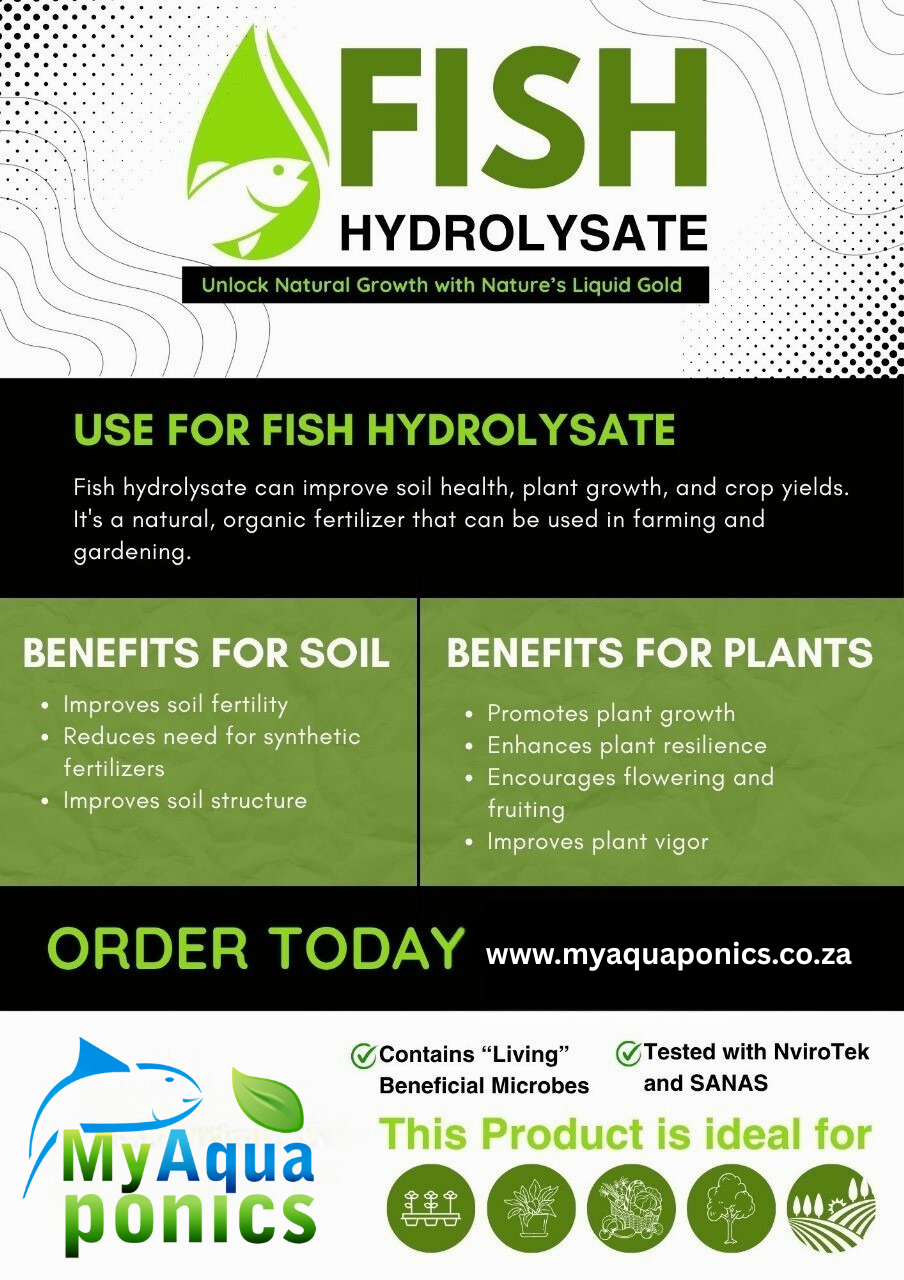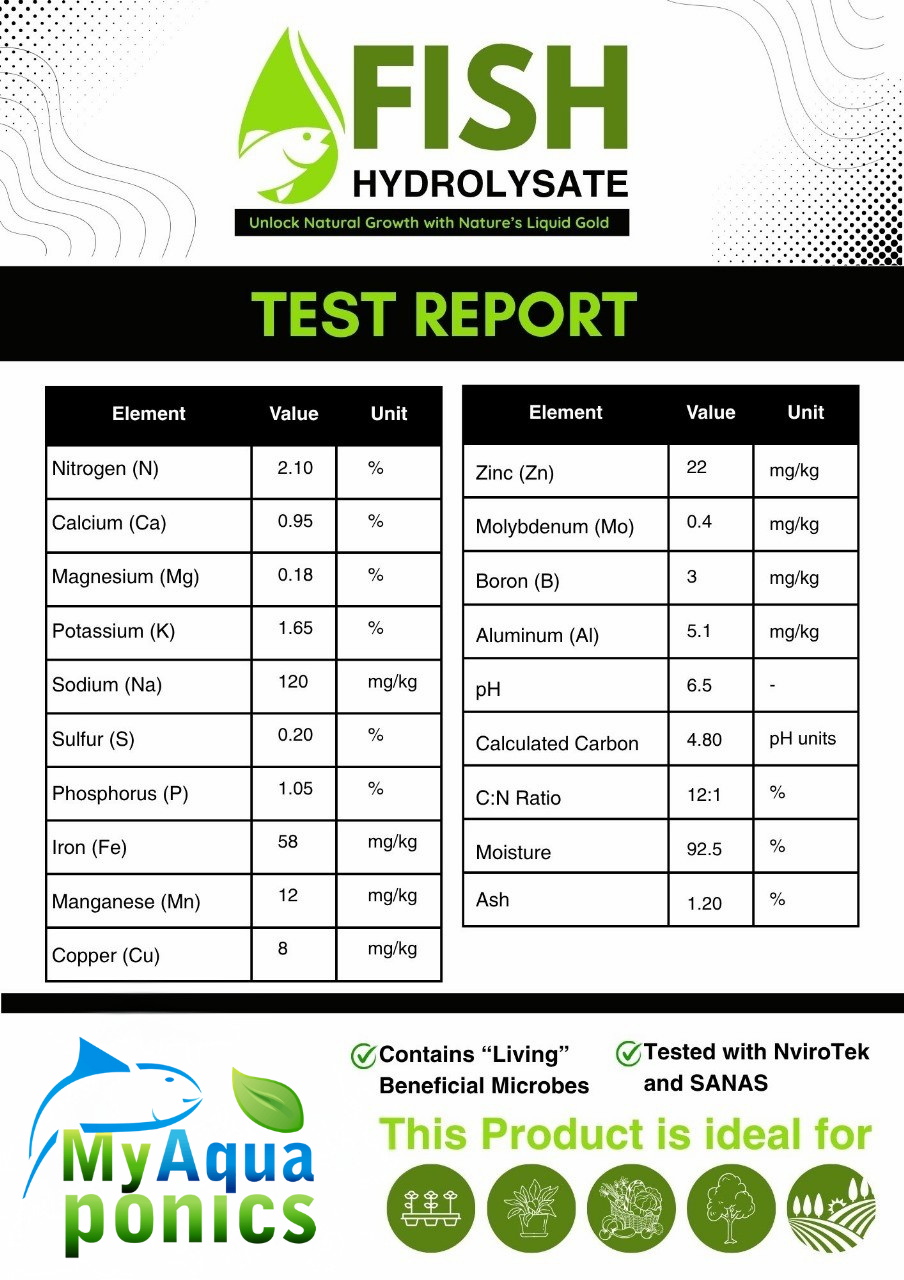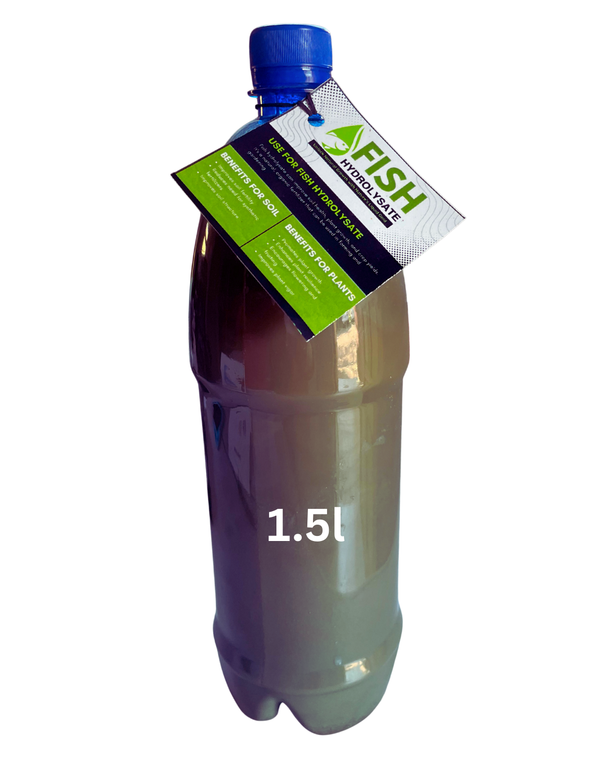
Fish hydrolysate is a nutrient-rich liquid organic fertilizer made from fish or fish by-products that have been broken down (hydrolyzed) into smaller components like peptides and amino acids. It is produced through a process called hydrolysis, where enzymes or acids break down fish proteins under controlled temperature and pH conditions. This results in a liquid containing soluble proteins, amino acids, minerals, and beneficial compounds.
Uses of Fish Hydrolysate:
- Agriculture: Used as a natural, organic fertilizer and soil conditioner. It enhances soil fertility by supplying nitrogen, phosphorus, potassium, micronutrients, amino acids, and peptides. It also stimulates microbial activity in the soil which improves plant health and growth.
- Hydroponics, Aquaponics and Crop Farming: Fish hydrolysate is a biostimulant that improves nutrient uptake, drought tolerance, and disease resistance in plants, resulting in higher yields and better quality crops.
- Aquaculture: It can be used as an environmentally friendly feed supplement for fish farming, promoting healthy fish growth and reducing the impact on ecosystems.
- Composting: Added to compost piles or worm farms to speed up the decomposition process and improve compost quality.
- Animal Feed: Fish protein hydrolysates serve as ingredients in animal feed or nutraceuticals, benefiting from the smaller peptides and amino acids that are easier to digest.
Summary:
This product supports sustainable agriculture by enhancing soil health, promoting plant and fish growth, and reducing reliance on synthetic fertilizers and feeds.
Recommended Dosages
The recommended dilution ratio for fish hydrolysate in gardening and agriculture typically ranges between 1:100 to 1:500 (fish hydrolysate to water) depending on the application method and crop needs:
-
For most soil applications, a common dilution is about 1 part fish hydrolysate to 100-300 parts water (1:100 to 1:300). This can be applied as a soil drench or via fertigation systems.
-
For foliar spraying (applying directly to leaves), a more diluted solution around 1:300 to 1:500 is advised to avoid leaf burn and ensure gentle nutrient uptake.
-
In gardening, some use roughly 0.5 tablespoon of fish hydrolysate per litre of water for soil drenching.
-
Frequency of application varies but is often every 1-4 weeks during the growing season depending on the crop's nutrient demand.
Specific guidance:
-
Use diluted fish hydrolysate as a soil conditioner, foliar spray, or compost inoculant.
-
Avoid applying undiluted or too concentrated solutions directly to plants to prevent damage.
-
Adjust dilution based on plant sensitivity, soil fertility, and growth stage.
This balance provides ample nutrients without overloading the plants, promoting healthy growth, soil fertility, and microbial activity in an organic, environmentally friendly way.
In summary, a typical recommended dilution for fish hydrolysate in gardening and agriculture is around 1:100 to 1:500, with lower concentrations for foliar sprays and higher for soil applications, applied during the growing season for best results


Does It Smell ?
Fish hydrolysate does have a noticeable smell, but it is generally described differently from the strong, unpleasant stench associated with traditional fish emulsion fertilizers. While fish emulsion often smells like rotten or putrid fish, fish hydrolysate is made using fresh fish residues processed with enzymes at lower temperatures, which results in a less offensive odour.
Some say fish hydrolysate smells fishy and can be a bit pungent or earthy, but it lacks the overpowering rotten-fish or "death" smell of fish emulsion. The smell is often described as a deep fishy odour that is attention-grabbing but usually dissipates within a few hours after application. Once diluted for gardening or agricultural use (typically at 1:100 to 1:500 ratios), the smell becomes much milder and less intrusive.
In summary:
-
Fish hydrolysate has a fishy odour, but it’s milder and less offensive than traditional fish emulsion fertilizer.
-
The smell can be strong initially but dissipates fairly quickly.
-
Dilution greatly reduces the odour.
-
Some commercial fish hydrolysate products are formulated to minimize smell for easier use indoors or in sensitive environments.
If you use fish hydrolysate as a fertilizer, expect a fishy scent during application, but this is normal and usually manageable with proper dilution and ventilation.
Note : Also Available in 5L subject to quote
KEEP OUT OF REACH OF CHILDREN







